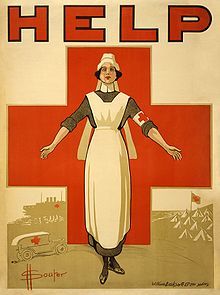Nurse union exploits Ebola crisis in negotiations

Seizing on the growing concern about the deadly West African virus, the California Nurses Association, one of the state’s most powerful unions, has added several Ebola-related provisions to its list of demands in its ongoing dispute with Kaiser Permanente. The two sides have been at an impasse for months over a new four-year contract for nurses at Kaiser’s Northern California hospitals.
In addition to more training about the Ebola virus and full-body hazardous material suits, the union wants hospitals to carry an extra life insurance policy that would make a cash payout for any Ebola-related death or injury.
“We are asking in our contract negotiations for an extra insurance policy,” Diane McClure, a Kaiser Permanent nurse, told KQED. “We’d like to have an extra supplemental coverage, specifically for Ebola, if we were to contract Ebola while we’re at work.”
The nurses say their new contract demands are merely a matter of health and safety.
“They went in with full Hazmats,” McClure said, explaining why the union was seeking access to the expensive equipment. “We want the same high standard for health care workers that are directly dealing with patients who are very ill.”
California Nurses Association blocked surgical masks mandate
The union accused the hospitals of spreading lies about Ebola.
“We’ve been lied to in terms of the preparation in the hospitals,” said RoseAnn DeMoro, executive director of the CNA, at an Ebola-related union rally this week.
The same could be said about the nurses union.
The union that’s now demanding full Haz-Mat suits just two years ago rejected a requirement that nurses wear surgical masks. Back in 2012, the CNA blocked common-sense legislation that would have decreased the spread of the flu in hospitals.
Senate Bill 1318, authored by Senator Lois Wolk, D-Davis, would have required employees in health clinics and hospitals “to either annually receive an influenza vaccination or, as an alternative to the annual influenza vaccination, wear a clinic-provided surgical or procedural mask.”
“These individuals regularly come in contact with health care personnel, and are at higher risk of flu complications and death,” Wolk said in a press release about her bill. “My legislation is an essential step toward preventing unnecessary deaths. The goal of SB1318 is to decrease deaths from influenza and make California hospitals and health care facilities safer places for patients and workers.”
You’d think workers in the health industry, who have a greater risk of infection, would understand the benefits of vaccinations and see the deadly effects of the flu and would be motivated to get a flu shot. However, based on data from the California Department of Public Health and a report by California HealthLine, four out of every 10 hospital workers were not vaccinated during the 2010-11 flu season.
“As a doctor of internal medicine, I would like nothing better than to tell this medical assistant to get a flu shot or stay away, but I have no such authority. Nor does my healthcare organization, which employs this medical assistant,” wrote Dr. Charity Thoman, an internal medicine physician in Southern California, in a piece at Zocalo Public Square.
Nurses worried about Ebola, but not flu
Organized labor came out in full force to stop the bill.
The CNA, the AFL-CIO, the California Labor Federation, Laborers’ Locals 777 and 792, the Service Employees International Union and the United Nurses Associations of California lobbied lawmakers that the surgical mask requirement was harmful to workers who, according to the legislative analysis, “should not be forced to wear the ‘Scarlett Letter’ of a mask just because they’ve chosen not to get a flu shot.”
Eventually, the bill was amended to remove the surgical-mask requirement. The watered-down version of the bill simply mandated that clinics and health facilities have a 90 percent or higher vaccination rate. That mandate — with no enforcement — was eventually vetoed by Gov. Jerry Brown.
“Health care workers are protected by union contracts, and unless the state of California overrides a given provision, the contract determines what employers can demand,” explained Dr. Thoman. “As things stand, if you want a healthy nurse, you have to keep your fingers crossed.”
Public health threat: Flu vs. Ebola
From a public health perspective, the flu is a greater threat to public safety than the Ebola virus. In 2010, 53,826 people died from influenza, making it the eighth leading cause of death in the United States, according to the Center for Disease Control. By comparison, the global death toll from the 2014 Ebola outbreak stands at 4,500 people — with just a single death in the United States.
The flu, which doesn’t get the same headlines as Ebola, isn’t a concern for the nurses union.
On Ebola: “We’re scared because as nurses we are the front line people to first come in contact with these types of patients,” Carol Kisner, a Sacramento nurse representing the CNA, told News 10 this week.
On the flu: The CNA told Fox 11 News earlier this year the nurses “strongly encourage voluntary vaccinations, but oppose forced vaccinations or the scarlet-letter type wearing of masks under threat of job loss or other discipline.”
Related Articles
CA on sidelines as brown energy revolution unfolds
In the 41 years since the OPEC cartel begin throwing its weight around, U.S. consumers have gotten used to fluctuations
Same old Dem story: Help for state’s ailing, needy not priority
Jan. 12, 2013 By Chris Reed On the California revenue front, whether times are good or bad, happy or sad,
1st and goal for NFL in L.A.
After years of speculation, planning, wrangling and setbacks, pro football is as close to returning to Los Angeles as it’s





